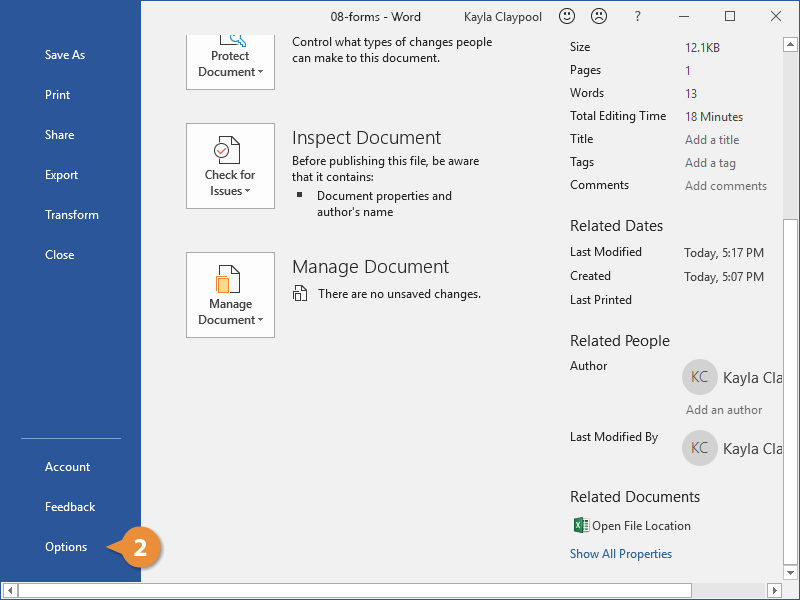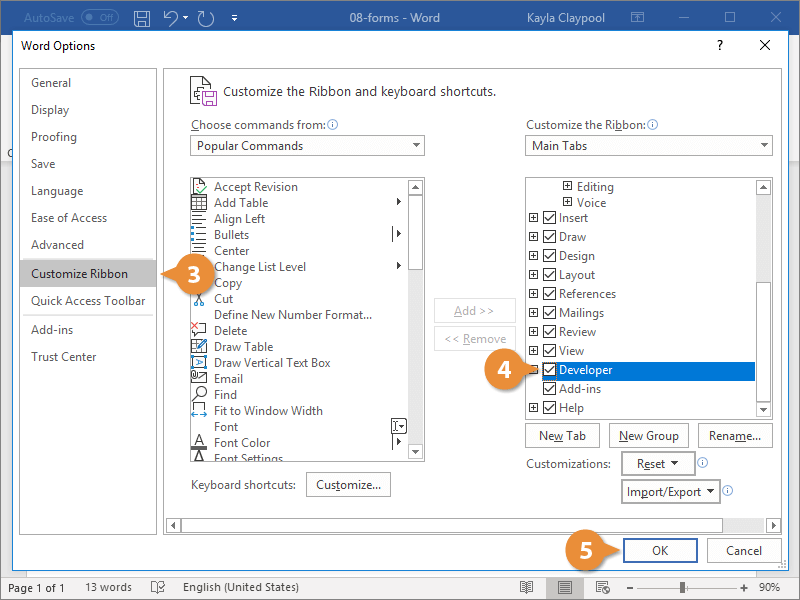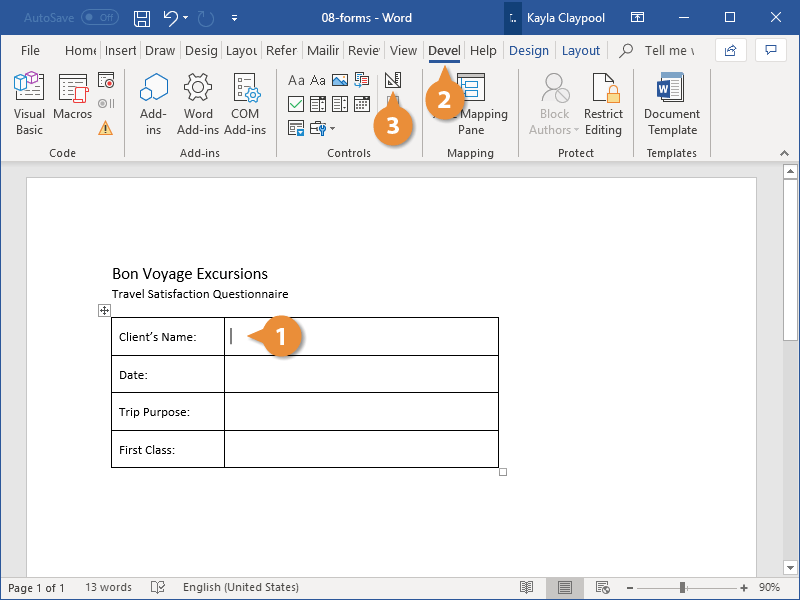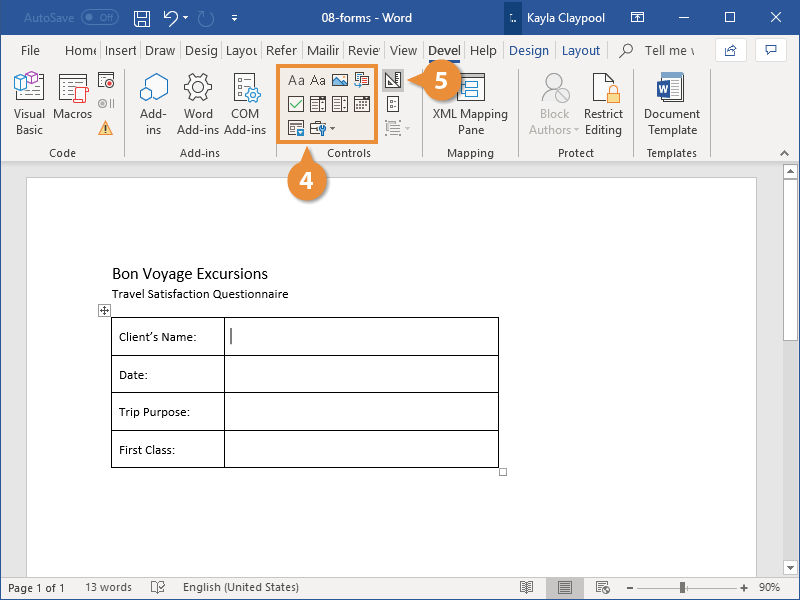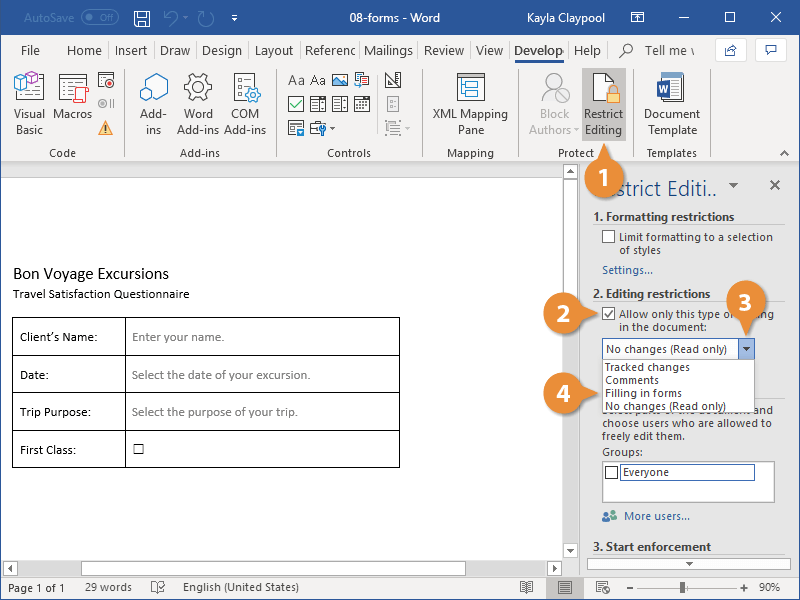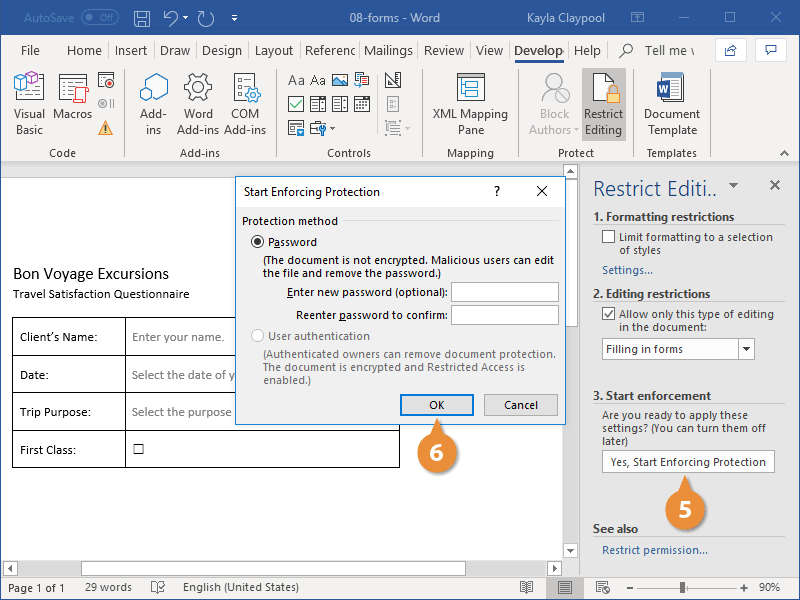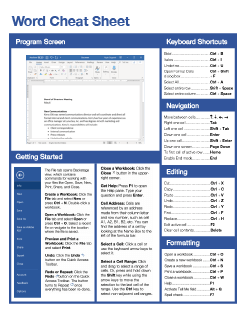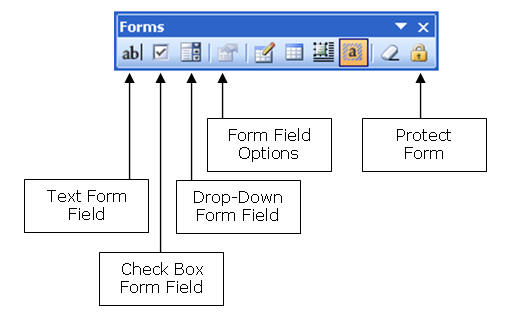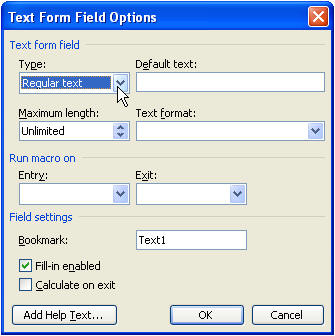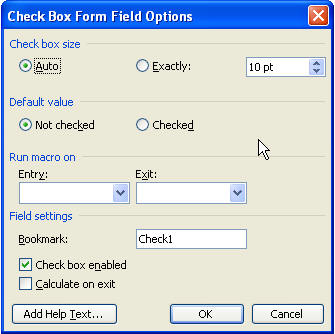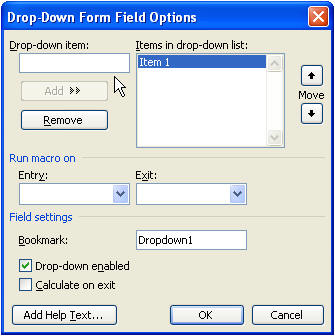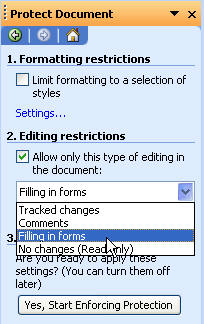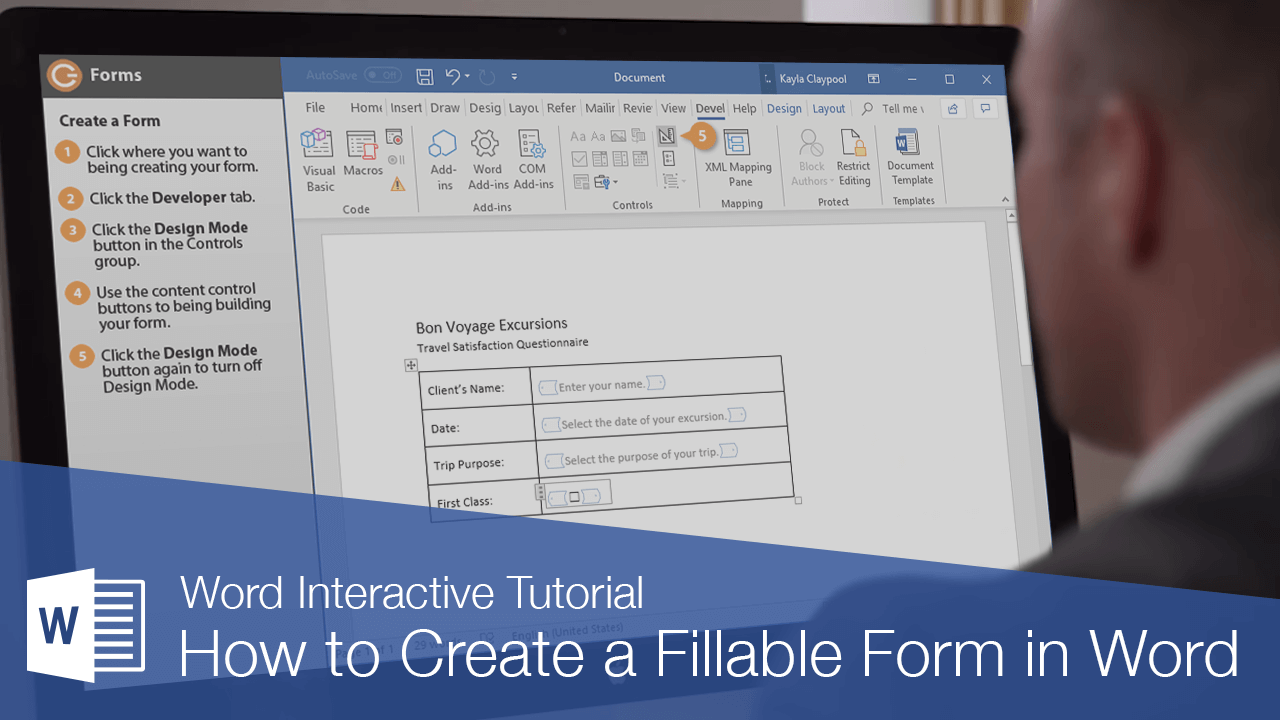
You can use Word to create interactive digital forms that other people can fill out on their computers before printing or sending them back to you. It takes a little preparation but keeps you from having to decipher messy handwriting! Some of the tools you will use when creating a form include:
- Templates: Forms are normally saved as templates so that they can be used again and again.
- Content controls: The areas where users input information in a form.
- Tables: Tables are often used in forms to align text and form fields, and to create borders and boxes.
- Protection: Users can complete the form fields without being able to change the form’s text and/or design.
Show the Developer Tab
Before you can create a form, you’ll need to turn on the Developer tab to get access to the advanced tools.
- Click the File tab.
- Select Options.
The Word Options window opens.
- Click the Customize Ribbon tab on the left.
The column on the right controls which ribbon tabs are enabled.
- Check the Developer check box.
- Click OK.
The Developer tab now appears on the ribbon. In addition to advanced tools for macro recording, add-ins, and document protection, we now have access to form controls.
Create a Form
Once you’ve enabled the Developer tab, and created the layout and structure of the form, you can start adding form fields to your document with Content Controls.
- Place the text cursor where you want to insert the form field.
- Click the Developer tab on the ribbon.
The Controls group contains the different kinds of content controls you can add to a form, as well as the toggle button for Design Mode.
- Click the Design Mode button in the controls group.
While Design Mode is active, controls you insert won’t be active, so clicking a check box to move it around won’t also check it. You can also customize placeholder text for some controls.
- Click a Content Control buttons to insert the selected type of control.
The content control is inserted.
Select a form field and click the Properties button on the ribbon to edit a control’s options. Depending on the type of control you’ve inserted, you can change its appearance, set up the options in a list, or lock the control once edited.
- When you’re done, click the Design Mode button again to exit Design Mode.
You leave Design Mode, and the content controls that you’ve inserted can now be used.
Types of Form Controls
There are many different types of form controls you can add to a form that will allow people to add different types of responses.
Finalize a Form
When you’re ready to distribute a form so others can fill it out, you can restrict the form so that content controls cannot be removed or changed by those filling it out.
- Click the Restrict Editing button on the Developer tab.
The Restrict Editing pane appears on the right.
- Check the Editing restrictions check box.
- Click the Editing restriction list arrow.
- Select Filling in forms.
When this option is enabled, the only change that anyone else can make to this document is the filling in of form fields. They won’t be able to move, delete, or edit the fields themselves until protection is turned off.
- Click the Yes, Start Enforcing Protection button.
A password is not required to start enforcing protection, but you can add one if you’d like to prevent just anyone from turning this protection off.
- Enter a password (optional), then click OK.
The document is now restricted, and anyone you send it to will only be able to fill in the forms.
FREE Quick Reference
Click to Download
Free to distribute with our compliments; we hope you will consider our paid training.
Basic rules: Create the form using the forms toolbar. Protect it. Here’s the
details…
First, you need the Forms toolbar. Turn it on by going to View Toolbars Forms.
Here’s the Forms toolbar, let’s get to know it better.
I have never used the tables or frame tools here, so I don’t
explain them. However, I do strongly recommend tables to create forms whenever
your forms are laid out in «boxes».
From left to right, here’s the buttons we’re reviewing. The
options dialog boxes are accessed by double-clicking the field, or by hitting
the Form Field Options button.
Text Form Field
This inserts a field designed for text entry. You can format it
for other things by double-clicking it, or by hitting the Form Field Options
icon. Change the type drop-down to a desired field type, such as a number or
date. You can set a maximum number of characters to be entered for items like
account numbers. You can choose Date as the type, and change the Text format to
read Sunday, June 19, 2005 instead of 6/19/2005.
You can also set a bookmark name here. Leave it as the default
Text# or change it to something meaningful, such as CoName. Then, when you later
want the Company name to appear again without making the user type it again, you
can create a
reference to the bookmark. If you plan to use the values entered in these
text form fields later in calculations, please check the Calculate on exit box!
Doing so makes your calculation field update as the values on which it is
dependent are entered.
Check Box Form Field
I don’t think I’ve ever checked these options out before, but
here they are. Unfortunately, checkboxes don’t work like option buttons do. If
you place multiple checkboxes, then multiple checkboxes can be chosen. If you
want only one checkbox to be chosen, you need Office VBA:
Macros You Can Use Today, which contains a macro by
Cindy Meister that
you can use, or you need to use Option buttons from the Control
Toolbox. Either option requires macro code.
Drop-Down Form Field
Drop-Downs are very cool and extremely easy to make. The only
drawback is that you’re limited to 25 entries, so you can’t use it for days of
the month or to list the US states.
Tip: To defeat the 25-item limit, try
separating your items into groups, such as east and west or 1 to 7, 7 to 14,
etc., or see this Microsoft KB Entry
http://support.microsoft.com/Default.aspx?kbid=306258
Tip: If you don’t want an item chosen by
default (or perhaps you want your form to be «blank» for printing), enter spaces
in the Drop-down item box to create a «blank» item, just make sure you move it
to the top.
Protect the Form
This button is used to test your form while you create it.
Protect the form to see how your form fields will work. Unprotect to continue
building your form.
Final Protection
You don’t have to use it, but I recommend it. When your form is
completely built and you’re ready to distribute it, choose Tools Protect
Document from the menu to bring up the Protect Document task pane. Choose
Editing restrictions, and Filling in forms.
You may only want to
protect certain
areas of your document. Once you’re done, hit the Yes, Start Enforcing
Protection button and (we highly recommend) enter a password.
More Tips
-
For best results, create your forms in tables. Place the label
in one cell and the form field in another cell next to it. -
To restrict entry to a certain amount of space, insert a
one-row, one-column table, and set the row height to «Exactly».
Section 2: Open a Template or Blank Document to Base the Form
It is supported to make an existing word document into a fillable form. And you can also set a new document and save it as your template for further usage.
If you Have a Form Template in Word Already:
Step 1: Search your form template
Choose File and click New to start with a form template. Later, you can search for Forms in the Templates search field.
Step 2: Choose the form that matches the type you need
Select the form, then click Download (Word 2010) or Create (Word 2013, Word 2016).
Step 3: Set the name for your new form template
Click Save As in the File left panel. Rename your new template if you need it. Then click Save to apply your change.
If You Want to Create Your Personal Form Template in Word:
Step 1: Head to Microsoft Word File list
After creating a form document, choose the File tab. Then click Save As under its list.
Step 2: Save the new document as a template
Select Word template from the drop-down Save as type. Later, rename it to distinguish it from others. And click Save to finish.
Section 3: Insert Any Content You Need to the Form
During this section, you can add many content and elements to create a fillable form in Word 2010/2013/2016. Of course, there is no need to apply all contents.
Step 1: Prepare to insert the controls you need
Click the place where you want to insert the control. Head to the Developer section and locate the Controls group. Then you can click the Design Mode option besides.
Step 2: Insert contents to create a fillable form with Microsoft Word
Insert a text control in a fillable form in a word:
Choose Rich Text Content Control or Plain Text Content Control options. Both of them have similar Aa icons.
Add a picture control in a fillable form in a word:
Find and click Picture Content Control besides Design Mode, which looks like a picture icon.
Add a building block control in a fillable form in a word:
Choose Building Block Content Control or Building Block Gallery Content Control in the second line of nine different icons.
Insert a combo box or a drop-down list in a fillable form in a word:
Click Combo Box Content Control or Drop-Down List Content Control. Choose Developer in the content control. Later, click Properties in the Controls group on the top. If you want to create a list of choices, you can select Add under Drop-Down List Properties. Then fill in the required information in Display Name and other options.
Insert a date picker in a fillable form in a word:
Click Date Picker Content Control that looks like a calendar. Then you can choose the date just like surfing an airline booking site.
Add a check box in a fillable form in a word:
Find and click a square icon with a check inserted Check Box Content Control. For instance, you can add a check box before a text to make an easy choice.
Note: You can set or change Properties after choosing any content control. Just as steps of inserting a drop-down list to create a fillable form in word mentioned above.
People Also Read:
- How to Insert PDF to Word
- How to Convert Pages to Word
- How to Change PDF to Word
СЛОВООБРАЗОВАНИЕ (WORD-BUILDING)
В английском языке имеется несколько способов словообразования:
1) конверсия (образование новых слов без изменения их написания и произношения)
2) словосложение (образование нового слова путем сложения двух слов в одно)
3) изменение ударения в слове (и получение нового слова другой части речи).
4) аффиксация (прибавление к корню суффикса или префикса)
Конверсия. Словосложение. Изменение ударения.
Иногда слово может менять свое значение и выполнять новую синтаксическую функцию в предложении, не изменяя при этом написания и произношения (конверсия). Наиболее распространенным является образование глаголов от существительных: master (хозяин) — to master (управлять), house (дом) — to house (размещать), water (вода) — to water (поливать). Но глаголы могут быть образованы и от прилагательных: empty (пустой) — to empty (опустошать) white (белый) — to white (белить).
Словосложение — это объединение полнозначных слов или их основ в сложное слово. Вновь образованное сложное слово пишется слитно или через дефис: airfield — аэродром (air — воздух, field — поле), air-base — авиабаза (air — воздух, base — база), airman — авиатор (air — воздух, man — мужчина), schoolday — школьный день (school — школа, day — день), birthplace — место рождения (birth — рождение, place — место).
Сложные слова могут состоять из двух существительных, первое из которых приобретает значение прилагательного. В этом случае слова пишутся отдельно. Например: service dress — форменная одежда, одежда для службы (service — служба, dress — платье), shop window — витрина (shop — магазин, window — окно), skim milk — снятое молоко (to skim — снимать (накипь и т.д.), milk — молоко).
Многие существительные совпадают по форме с глаголами, но отличаются ударением. Как правило, в существительных ударение падает на первый слог, а в соответствующих глаголах — на второй: export (экспорт) — to export (экспортировать) present (подарок) — to present (дарить).
Словообразование с помощью аффиксации.
Образование новых слов может происходить при помощи присоединения к основе слова суффиксов или префиксов (приставок). Префиксы присоединяются к корню слова в начале, а суффиксы — в конце. Слова, образованные с помощью префиксов или суффиксов, в отличие от простых слов, называются производными.
Префиксы, как и суффиксы, могут присоединяться к различным частям речи, изменяя при этом значение основы слова, например: happy (счастливый) — unhappy (несчастный) — happiness (счастье) — happily (счастливо); help (помощь) — helper (помощник) — helpful (полезный) — helpless (беспомощный).
Наиболее употребительные приставки (префиксы) и их значения:
1. Префикс со значением “снова”, “заново”, “вновь”, “пере”:
|
re- |
to construct (строить) — to reconstruct (перестроить), to read (читать) — to reread (перечитать), to write (писать) — to rewrite (переписать) |
2. Префиксы, которые придают слову противоположное значение или обозначают противоположное действие:
|
un- dis- de- anti- counter- contra- |
to dress (одеваться) — to undress (раздеваться), to tie (связывать) — to untie (развязывать) to appear (появляться) — to disappear (исчезать) formation (формирование) — deformation (деформация) fascist (фашист) — anti-fascist (антифашист) attack (атака) — counterattack (контратака) to contradict (противоречить, возражать) |
3. Префиксы, имеющие отрицательное значение:
|
a- ab- un- im- in- ir- il- dis- mis- non- |
amoral (аморальный, безнравственный) absent (отсутствующий), abnormal (ненормальный) kind (добрый) — unkind (недобрый) possible (возможный) — impossible (невозможный) ability (способность) — inability (неспособность) regular (регулярный) — irregular (нерегулярный) legal (легальный) — illegal (нелегальный) honest (честный) — dishonest (нечестный), to understand (понимать) — to misunderstand (неправильно понять) interference (вмешательство) — non-interference (невмешательство) |
! NOTE ! Приставка, которая начинается на “i” изменяется в зависимости от того, какая за ней стоит буква: il + l, ir + r, im + b, m, p. |
4. Префиксы, имеющие значение “сверх”, “пере”, “чрезмерно”:
|
over- super- ultra- extra- |
to pay (платить) — to overpay (переплатить) human (человеческий) — superhuman (сверхчеловеческий) short (короткий) — ultra-short (ультракороткий) extraordinary (необычный) |
5. Префиксы со значением “между”, “взаимно”:
|
со- inter- |
existence (существование) — co-existence (сосуществование) national (национальный) — international (интернациональный) |
6. Префиксы, которые переводятся как
а) “перед”:
|
рге- fore- |
war (война) — pre-war (довоенный), historic (исторический) — prehistoric (доисторический) to foresee (предвидеть) |
б) “после”:
|
post- |
war (война,) — post-war (послевоенный), revolutionary (революционный) — post-revolutionary (послереволюционный) |
в) “недостаточно”, “недо-“:
|
under- |
to pay (платить) — to underpay (оплачивать низко, т.е. недостаточно оплачивать, недоплачивать), production (производство) — underproduction (недопроизводство) |
г) “под”:
|
sub- |
division (разделение) — subdivision (подразделение), committee (комиссия, комитет) — subcommittee (подкомиссия) |
д) “экс”, “бывший”:
|
ex- |
champion (чемпион) — ex-champion (бывший чемпион) |
е) само-, авто-
|
auto- |
autobiography (автобиография), automatic (автоматический) |
ж) полу-
|
semi- |
semifinal (полуфинал), semicircle (полукруг) |
з) через-, транс-
|
trans- |
transatlantic (трансатлантический) |
и) вверх, кверху, наверху
|
up- |
upstairs (вверх по лестнице), upside (верхняя часть), to uproot (вырывать с корнем) |
к) двойной, два, дважды
|
bi- |
bilingual (двуязычный), bi-monthly (выходящий два раза в месяц) |
л) имеющий дело с книгами
|
bibli(o)- |
bibliography (библиография) |
м) относящийся к жизни
|
bio- |
biography (биография) |
н) второстепенное значение
|
by- |
by-street (переулок, улочка) |
о) много-, мульти-, поли-
|
multi- poly- |
multicolored (многоцветный), multimillionaire (мультимиллионер) polyglot (полиглот), polytechnic (политехнический) |
п) второстепенное значение
|
by- |
by-street (переулок, улочка) |
7. Префикс глагола, имеющий значение “делать”:
|
en- |
large (большой) — to enlarge (увеличивать, делать больше), danger (опасность) — to endanger (подвергать опасности), force (сила) — to enforce (принуждать, настаивать) |
Основные суффиксы существительных:
1. Суффиксы, обозначающие принадлежность к
а) политическому направлению профессии или нации:
|
-ist -an, -ian |
Communist (коммунист), Marxist (марксист}, materialist (материалист); artist (художник), typist (машинистка), pianist (пианист), historian (историк), librarian (библиотекарь), musician (музыкант); Russian (русский), Bulgarian (болгарин) |
2. Суффикс, обозначающий учение, теорию, качество:
|
-ism |
marxism (марксизм), heroism (героизм) |
3. Суффиксы, обозначающие действующее лицо, его занятие или должность:
|
-ег, -or -ee, -eer |
to teach (учить) — teacher (учитель), to direct (руководить) — director (руководитель) employee (служащий), refugee (беженец, эмигрант), auctioneer (аукционер), |
4. Суффикс, обозначающий результат действия:
|
-ment -ade |
achievement (достижение), agreement (согласие), government (правительство) lemonade (лимонад), blockade (блокада) |
5. Суффиксы, обозначающие
а) состояние:
|
-hood -ship -cy, -acy |
brotherhood (братство), childhood (детство), manhood (мужественность) dictatorship (диктатура), friendship (дружба), leadership (руководство) accuracy (точность), infancy (младенчество), supremacy (превосходство) |
б) действие, состояние:
|
-age -ing -ence -ance -ion, -tion -ition, -ation -sion -al |
shortage (нехватка), marriage (брак, супружество), voyage (путешествие) hunting (охота), crossing (пересечение, перекресток), living (житье) silence (молчание), difference (различие) importance (важность), resistance (сопротивление) collection (собрание, коллекция), dictation (диктант, диктовка) competition (соревнование), hesitation (сомнение, колебание) decision (решение) removal ( удаление), arrival (прибытие), refusal (отказ), approval (одобрение) |
в) качество или состояние:
|
-dom -ness -ty |
freedom (свобода), kingdom (королевство), wisdom (мудрость) coldness (холод), darkness (темнота), kindness (доброта), weakness (слабость) activity (активность), safety (безопасность) |
г) место действия, занятие или состояние
|
-ery |
bakery (булочная), surgery (кабинет хирурга), cookery (кулинария), slavery (рабство) |
д) род занятий, отрасль науки
|
-ics |
physics (физика), politics (политика) |
Основные суффиксы прилагательных:
1. Суффикс, образующий прилагательные от существительных и обозначающий национальную принадлежность или слабую степень качества:
|
-ese -ish |
Chinese (китаец, китайский), Japanese (японец, японский) Pole (поляк) — Polish (польский), Scott (шотландец) — Scottish (шотландский) red (красный) — reddish (красноватый), child (ребенок) — childish (ребячливый, детский) |
2. Суффиксы, образующие прилагательные от глаголов и обозначающие наличие качества:
|
-ive -ent -ant |
to act (действовать) — active (активный), to talk (разговаривать) – talkative (разговорчивый) to differ (различать) — different (различный), to insist (настаивать) — insistent (настойчивый) to observe (наблюдать, замечать) — observant (наблюдательный, внимательный) |
3. Суффиксы, образующие прилагательные от существительных
и обозначающие наличие качества, свойства:
|
-ic -al -ful -ous -у |
base (основа) — basic (основной), economy (экономика) — economic (экономический) centre (центр) — central (центральный) culture (культура) — cultural (культурный), beauty (красота) — beautiful (красивый) peace (мир) — peaceful (мирный), fame (слава) — famous (знаменитый) cloud (облако) — cloudy (облачный), sun (солнце) — sunny (солнечный) |
4. Суффиксы, образующие прилагательные от различных частей
речи и обозначающие
а) качество, свойство:
|
-аrу -огу |
element (элемент) — elementary (элементарный) illusion (иллюзия) — illusory (обманчивый, иллюзорный) |
б) способность что-либо сделать, состояние, качество:
|
-able — ible |
to change (изменить) — changeable (изменчивый) to eat (есть) — eatable (съедобный), reason (разум) — reasonable (разумный) |
в) отсутствие качества:
|
-less |
useless (бесполезный), windless (безветренный) |
Основные суффиксы глаголов:
|
-ate -en -fy, -ify -ize, -ise |
active (активный) — to activate (активизировать) short (короткий) — to shorten (укоротить) pure (чистый) — to purify (очищать), simple (простой) — to simplify (упрощать) character (характер) — to characterize (характеризовать) |
Основные суффиксы наречий
Суффиксы, образующие наречия от
а) прилагательных, иногда — существительных, порядковых числительных и причастий:
|
-ly |
bad (плохой) — badly (плохо), part (часть) — partly (частично), first (первый) — firstly (во-первых) |
б) существительных и наречий и обозначающие направление (или направленность):
|
-wards -ward |
North (север) — northward(s) (к северу, на север), after (после) — afterwards (впоследствии, позже, потом), back (обратно, назад) — backward(s) (назад, в обратном направлении) home (дом, домой) — homeward (к дому, по направлению к дому) |
NOTE! В английском языке большое место занимают слова, заимствованные из других языков. Такие слова называются интернациональными. По корню этих слов легко догадаться об их значении. Например: telegram (телеграмма), orchestra (оркестр), concert (концерт) и др. Умение подмечать интернациональные слова в значительной степени облегчает работу по переводу текста.
WORD-BUILDING (exercises)
Ex. 1. Переведите следующие слова, выделите в них суффиксы и префиксы:
Untrue, prehistoric, ultramodern, postwar, ex-champion, anti-body, decompose, decode, deform, depart, discover, disappearance, reread, reconstruct, coauthor, unequal, misunderstand, undress, disarm, anti-fascist, cooperation, co-existence, interaction, superhuman, ultra-violet.
Ex. 2. Определите, к какой части речи относятся следующие слова. Переведите их:
Achievement — achieve, resistance — resistant, assistance — assist — assistant, celebration — celebrate, difference — different, city — citizen, nation — national — nationality, measure — measurement, develop — development, act — active — activity, contain — container, discover — discovery — discoverer, literature — literary, graduate — graduation — undergraduate — post-graduate, educate — education, progress — progressive, act — action — activity — active, govern — governor — government.
Ex. З. Образуйте от данных глаголов существительные с помощью суффикса -ег или -or. Переведите на русский язык:
To lead, to write, to read, to visit, to speak, to sleep, to act, to direct, to conduct, to drive, to fight, to mine, to report, to sing, to skate, to swim, to teach, to travel, to sail, to invent, to found, to compose.
Ex. 4. Образуйте от данных слов существительные с помощью суффикса -ist, -ism, -ian. Переведите на русский язык:
Special, social, art, capital, economy, international, piano, technic, mathematics, statistics, politics, music, electric, Russia, Hungary, Canada, India.
Ex. 5. Образуйте от данных глаголов существительные с помощью суффикса -ment. Переведите на русский язык:
Develop, achieve, move, arrange, treat, state, improve, agree, equip, govern, require, measure, announce, pave.
Ex. 6. Образуйте прилагательные с помощью суффиксов -ful и -less, переведите их на русский язык:
Beauty, thank, hope, doubt, care, aim, use, shape, fruit, power, thought, harm, colour.
Ex. 7. Образуйте прилагательные с помощью суффиксов -able, -ible, переведите их на русский язык:
Change, convert, prevent, break, compare, desire, profit, read, comfort, respect, expect.
Ex. 8. Найдите и выделите суффиксы в данных словах и определите, к какой части речи эти слова относятся:
British, foolish, understandable, heartless, pitiless, successful, experiment, function, musician, socialist, artist, capitalism, professional, fundamental, industrial, doubtful, useful, different, treatment, creative, attractive, peaceful, dangerous, elementary, childish, active, economic, director, worker, passage, marriage, silence, freedom, kingdom.
Ex. 9. Образуйте глаголы с помощью суффикса -en:
Red, tight, soft, deep, short, dark, bright, weak, black, white, sweet, sharp, strength.
Ex. 10. Образуйте наречия с помощью суффикса -1у и переведите их:
Bad, first, part, quick, strong, short, silent, rapid, wide, extreme, cruel, kind, happy.
Ex. 11. Образуйте глаголы от данных существительных. Переведите их:
Turn, smile, smoke, snow, start, stay, step, stop, study, talk, visit, rest, air, paper, cover, handle, cause, watch, act, address, answer, brush, clean, cross, crowd, wave, wish, work, dance, doubt, dress, end, fight, help, hope, joke, laugh, lift, light, love, mind, paper, pencil, place, plan, play, post, reply, report, return, sail, show.
Ex. 12. Переведите на русский язык. Выделите словообразующие элементы. Определите, к какой части речи относятся данные слова:
React, reaction, reactor, reactivity; science, scientific, scientist; industry, industrial, industrious; cold, coldly, coldness; dark, darkness, darken; happy, happily, happiness, unhappy; equal, equally, unequal, equality; free, freedom, freely; attention, attentive, attentively; sun, sunny, sunless; care, careful, careless, carefully, carelessness; to differ, different, difference, indifferent; England, English, Englishman; fame, famous.
Ex. 13. Переведите следующие сложные слова:
Airport, armchair, bathroom, bedroom, bookcase, bookshelf, classroom, custom-house, dining-room, drawing-room, fireplace, folksong, gentleman, hairbrush, icebox, newspaper, notebook, postcard, post-office, raincoat, sportsman, sunshine, writing-table.
Ex. 14. Прочтите следующие пары слов, соблюдая ударения. Переведите их:
An accent — to accent, a contract — to contract, a content — to content, a contest — to contest, a convoy — to convoy, a convict — to convict, a perfect — to perfect, a record — to record.
Ex. 15. Определите, к каким частям речи относятся выделенные слова:
1. Не works as a teacher. 2. I saw one of his works at the exhibition. 3. I was waiting for your report. 4. They report the results of their experiment every Monday. 5. His report contains some of his thoughts about the experiment. 6. You’ll make progress if you work hard. 7. He thought about his new work. 8. I have a present for you. 9. I am busy at present. 10. He presented me with a book.
Ex. 16. Проанализируйте состав следующих слов. Определите части речи. Дайте начальную форму. Переведите слова:
Powerful, inventor, high-quality, network, demoralize, profitable, dislike, disagree, movement, shorten, incorrect, electricity, fruitful, fruitless, happiness, dangerous, noisy, sunny, rainy, badly, strongly, reading, teaching, rebuild, retell, leader, teacher, unhappy, unusual, translation, cooperation, schoolboy, icebreaker.
Ex. 17. Напишите сложные существительные, исходя из объяснений.
Например: A machine for drying hair – hair drier.
1. A thing for opening tins — … . 2. A machine for playing records — … . 3. A machine for mixing food — … . 4. A thing that times eggs (when they are boiling) — … . 5. Things for warming people’s legs — … . 6. Stuff that kills flies — … . 7. A liquid that removes paint — … . 8. A tool that opens bottles — … . 9. A thing for peeling potatoes — … . 10. A liquid for removing eye makeup — … . 11. Stuff for freshening the air — … .
Ex. 18. Напишите словосочетания по модели число+ существительное+существительное (! не забывайте что число и первое существительное соединяется дефисом и что это существительное обычно стоит в единственном числе)
Например: a walk lasting for three miles – a three-mile walk.
1. A girl who has just celebrated her sixteenth birthday — … . 2. A flight lasting for ten hours — … . 3. A note that is worth twenty pounds — … . 4. A language course that lasts four weeks — … . 5. A drive that takes three hours — … . 6. A meal that consists of three courses — … . 7. A holiday that lasts two weeks — … . 8. A delay at the airport that went on for two hours — … . 9. A letter that goes on for ten pages — … . 10. A university course that takes three years — … . 11. A prison sentence of ten years — … . 12. A hotel with five stars — … . 13. A speed limit of 30 miles an hour — … . 14. A house that was built two hundred years ago — … .
Ex. 19. Распределите прилагательные по трем группам: 1) люди, 2) места, 3) вещи:
Obstinate, unspoilt, hand-made, waterproof, easy-going, breathtaking, aggressive, deserted, overgrown, overcrowded, cunning, picturesque, arrogant, long-lasting, spoilt, automatic, accurate, artificial.
Ex. 20. Выберите слово с нужным по смыслу префиксом или суффиксом.
1. I know Jim Kerry is very popular but I find him totally childish / childlike. 2. I couldn’t work out whom the letter was from. The signature was childish / childlike. 3. Sarah is so childish / childlike. She always plays trick on her friends. 4. It was wonderful to watch the tiny lambs playing. I got such childish / childlike pleasure from the experience. 5. Sophie is extremely sensitive / sensible at the moment. Anything you say seems to upset her. 6. Karen is not a very sensitive / sensible person. She wore high-heeled shoes for our four-mile walk. 7. I’ve never known her to tell a lie. She’s a very true / truthful person. 8. I can never watch sad films that are based on true / truthful a story. They always make me cry. 9. Susan is so intolerable / intolerant of other people. She never accepts anyone else’s opinion, and she always thinks she knows best. 10. I find Mark’s behaviour intolerable / intolerant. It’s unfair to be so selfish. 11. We’re having an economic / economical crisis at the moment. James has lost his job and I don’t know how we are going to pay the rent. 12. It’s more economic / economical to drive slowly. You can do a lot more miles to the gallop.
Ex. 21. Подберите к каждой тройке слов такое, чтобы с его помощью образовать составные существительные, используйте слова: board, green, paper, book, birthday, blood, rain, site, road, sports, ice, water, day, night, hand, case, sun, bag.
Например: camp…, building…, bomb… – campsite, building site, bomb-site.
1. …test, …pressure, …donor. 2. …fall, …melon, …skiing. 3. …house, …grocer, …salad. 4. …club, …mare, …shift. 5. brief…, suit…, book… . 6. paper…, plastic…, shoulder… . 7. …bow, …coat, …drop. 8. …shine, …rise, …set. 9. …works, …sign, …rage. 10. black…, floor…, notice… . 11. …light, …break, …dream. 12. …shake, …writing, …book. 13. …cube, …berg, …rink. 14. …cake, …present, …card. 15. …scape, …lady, …slide. 16. …car, …center, …ground. 17. address…, visitor’s…, note… .
Ex. 22. Дополните предложения сложными существительными в скобках (это могут быть и составные существительные, и существительные в притяжательном падеже в простой или аналитической форме).
1. Your coat is on the … (back, chair). 2. You’ve just spilt the … (milk, cat). 3. Can you buy some … (paper, toilet). 4. I never listened to my … (advise, parents). 5. Can you buy a … (wine, bottle) to have with supper? 6. What did that … (road, sigh) say? Did you see it? 7. It’s such a mess in here. There are empty … (wine, bottles) everywhere. 8. The … (Prime Minister, duties) include entertaining heads of the state. 9. The … (my shoe, heel) has come off. 10. Can I borrow your … (brush, hair)? 11. What happened at the … (film, end)? 12. Here is … (today, news). 13. Where is the nearest … (Metro, station)? 14. It’s my … (anniversary, parents, wedding) next week. 15. The … (company, success) is due to its efficiency. 16. I’ve got a … (fortnight, holiday) next month. 17. The … (government, economic policy) is confusing. 18. My children go to the local … (school, state). 19. The annual … (rate, inflation) is about 4 percent. 20. Are there any … (coffee, cups) in your bedroom? There are none in the kitchen. 21. Do you want a … (coffee, cup)?
Ex. 22. Заполните пропуски глаголом или существительным: advice – to advise, use – to use, abuse – to abuse, belief – to believe, relief – to relieve, grief – grieve, excuse – to excuse, breath – to breathe, half – to halve, house – to house, safe – to save, bath – to bathe.
1. It is my personal … that this man is innocent. 2. Let me listen to your chest. Take a deep … and say “Ah”. 3. You should put your valuables in the … . 4. Drug … is a terrible problem all over the world. 5. I know it isn’t good for my skin, but I love sun … . 6. I’ve been so worried about you! It’s such a … to see you at last! 7. “What are we going to do with this cake?” “Cut it in two. You take … and I’ll take … .” 8. Can you show me how to … this new coffee machine? 9. The refugees are … in temporary accommodation. 10. She apologizes for her behavior, and said it was because she’d had a busy day, but that’s no … for breaking all the plates. 11. People need time to … after the death of someone they love. 12. Take my … . Never marry for money. Marry for love.
Ex. 22. Напишите слово противоположное по значению, используя префикс
Kind, honest, credible, appear, fair, equal, pleased, continue, fasten, normal, employed, friendly, trust, professional, known, cover, safe, use, probable, important, emotional.
WORD-BUILDING (Test)
1. Определите, к какой части речи относятся данные слова. Переведите их:
Beautiful, function, artist, musician, heartless, economic, worker, badly, act, action, active, basic, fruitless, population, movement, historic, democratic, work, daily, literature, picture, organization, friendship, highly, leader, fight, fighter, national, impressive, hopeful, hopeless, beautiful, special, specialist, define, definition, humanism, humanist, humanistic, use, useful, useless.
2. Переведите слова на русский язык. Определите префикс и его значение:
Coauthor, undress, disarm, postwar, illegal, unkind, reconstruct, deformation, prewar, antibody, ex-champion, superhuman, ultrashort.
3. Образуйте прилагательные от существительных при помощи следующих суффиксов: -al, -ful, -ous, -у, -able, -ible, -ic, -less, -ish. Переведите пары слов.
Reason, beauty, hope, doubt, care, aim, use, desire, boy, success, heart, experiment, form, office, danger, fame, electron, base, nature, cloud, sun, child, Scott, history, home.
4. Переведите предложения. Определите, к каким частям речи относятся выделенные слова. Назовите сложные слова:
1. Many pupils study English. 2. My grandfather has a large study. 3. Who ruled this country? 4. All sportsmen must obey the rules of the game. 5. The Soviet Union is tied by friendship with India in their work for peace. 6. All peace-loving people work for peace for the whole of mankind.
5. Назовите глаголы, от которых образованы следующие существительные:
Protection, show, writer, worker, movement, investigation, achievement, statement, reader, department, equipment, construction, organization, reporter, arrival, improvement, conductor, establishment, development, education, definition, regulation, assistance, agreement.
6. Переведите без словаря. Определите, к какой части речи относятся слова:
a) Specialist, institute, university, culture, central, national, nation, international, organization, Soviet, minister, nature, natural, traditional, progressive, moral, social, socialist, public, programmer, popular, modern, revolution, revolutionary, final, talent, continent, festival, political, experiment, experimentation, electricity, technical, transformation, system, systematically, practice, practical, seminar, lecture, lecturer, period, historic, history, professor, complex, form, acceleration, instrument, philosopher, idea, basic, fundamental, conceptions, mass, class, element, motor, method, problem, energy, radio, text, material, temperature, progress, television.
b) 1. France and England are European countries. 2. In the evening we like to listen to classical music. 3. We saw a comedy at the Drama Theatre last night. 4. Your train leaves from platform two. 5. This jazz orchestra gave several concerts in our town. 6. In 1610 Galileo constructed the first telescope in the world. 7. This was a dangerous experiment.
7. Проанализируйте следующие слова, какие они? Определите их составляющие. Переведите на русский язык:
Ice-hockey, world-wide, bedroom, newspaper, long-term, birthplace, sportsman, apple-pie, peace-loving, schoolchildren, football, highland, television, underground, north-west, sometimes, lowland, landscape, well-known, multinational, network, vice-president.
8. Поставьте слово, указанное в скобках, в нужную форму.
1. My father is very … (act) even though he’s seventy. 2. I’ve always wanted to work in the theatre, but … (act) it isn’t a very secure profession. 3. I … (hope), we’ll soon find a solution to the problem. 4. Look … (care) to the left and to the right before crossing the road. 5. It was very … (care) of you to lose my watch. 6. I take two … (day) newspapers and three Sunday papers. 7. You’ve broken my camera! Look at it! It’s … (use)! 8. Thanks for the advice. It was really … (use). 9. I have some very … (noise) neighbours. 10. She became … (fame) as a result of her invention.


